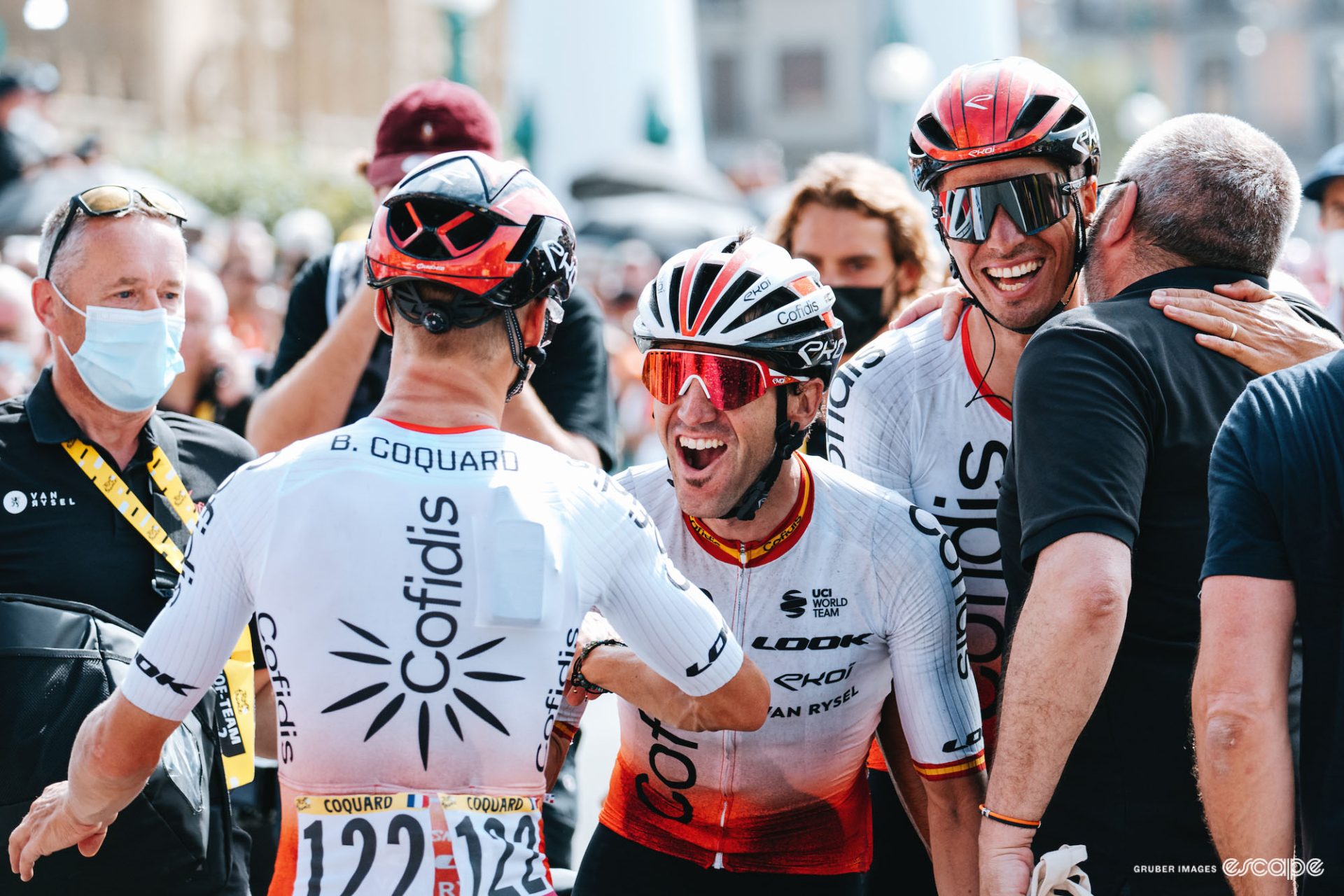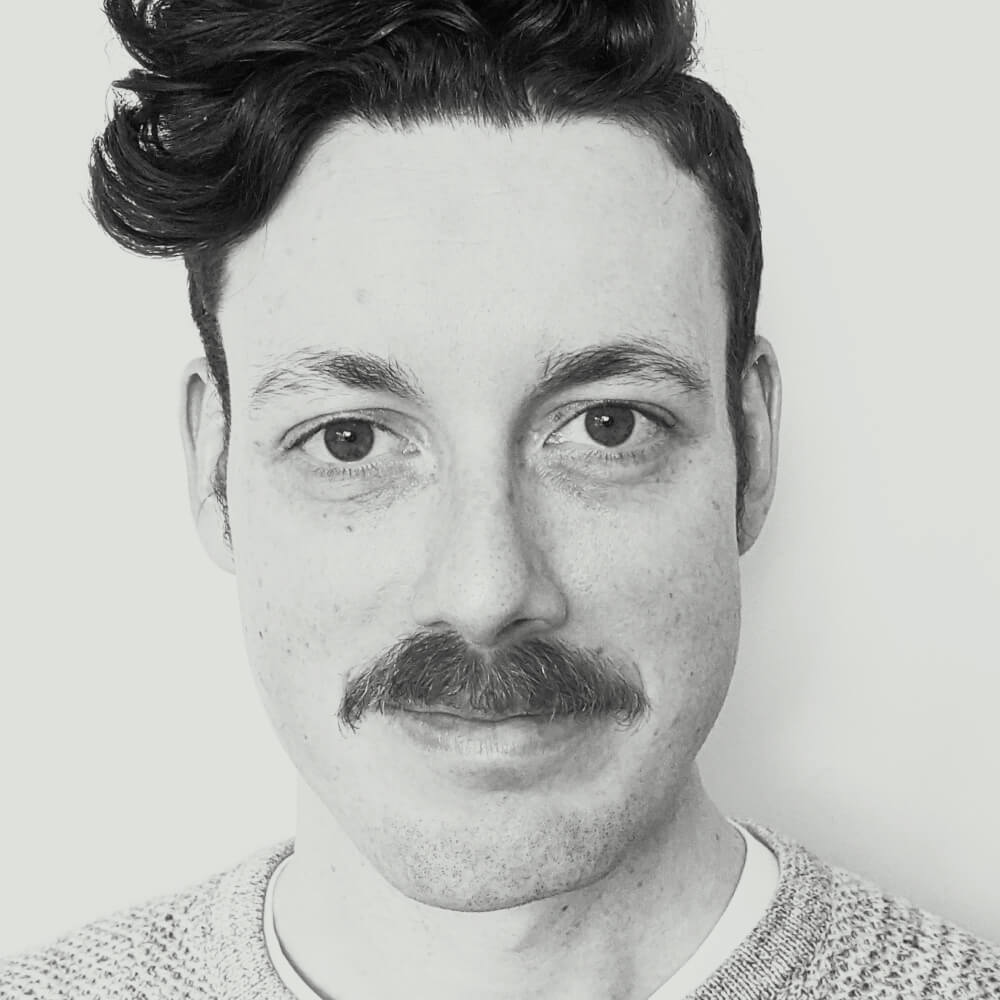Twenty-four hours ago, Victor Lafay was the other name on everyone’s lips. The 27-year-old Frenchman had been the only rider able to follow Tadej Pogačar and Jonas Vingegaard on the first power climb of the Tour de France, cresting the Côte du Pike with two of the best. Among all but the most dedicated followers of the sport, though, Lafay was a bit of an unknown. Searches for him on cycling stats websites exploded – up 16,000 week-on-week – as clues were sought for where the Frenchman had come from, and where he might go next.
A day later in San Sebastián, there was an answer. Pogačar and Vingegaard had soared free again, on the slopes of the Jaizkibel, before being reabsorbed into an elite group of riders – climbers, puncheurs like Wout Van Aert, wily opportunists like Tom Pidcock. Through the outskirts of town, moves went and moves failed. And then, under the red flag of 1 km to go, a long lean figure in Cofidis’ red, white, and black broke to the left of the road. A small gap became a big gap, and for an agonising minute the race hung in the balance – but the catch was too late, and the win was Lafay’s. And with that, Lafay’s search results spiked again, doubling from the day before.
Lafay, from Lyon, has spent his entire professional career with Cofidis, spending two stints as an espoir in 2017-18 before his first full season in 2019. While the opening two days of this Tour de France have been the pinnacle of his career thus far, he’s not come out of nowhere – in 2021, he won a stage of the Giro d’Italia from a small breakaway, and he’s challenged for results at punchy smaller races like the Arctic Race of Norway, finishing third on GC that same year. But under the radar, there’s a respect for him among his peers. Jumbo-Visma’s Tiejs Benoot, a man of a similar skillset, said that Lafay is “a rider we all know … on the short kickers, he always showed he is really of the highest level in the world. To do this at the Tour … for a rider like this, it’s not really surprising.”

There was no kicker in the immediate finale of today’s stage, but Benoot’s comment hints at Lafay’s ability to push himself hard, to ride with aggression. Lafay put it more viscerally in a post-win interview, breaking down the finale with French flair: “The first 500 metres you go with enthusiasm; the second 500, you go with toxins.”
An effort like this is often an ill-fated one. “I looked down at my computer… I saw 500 metres, 400 metres … I said to myself I will inevitably be caught at 50 metres.” The detail of why he wasn’t is hidden in the numbers of that last kilometre: after more than 200 kilometres of racing, a last desperate push to the line averaging 56.4 km/h.
For Lafay it’s a win that seems likely to alter the trajectory of his career, and there’s a huge significance for his team. Cofidis has spent years hovering in that murky space between the upper echelons of the ProTeam category and the lowest reaches of the WorldTour. Their budget is a fraction of the biggest squads, and their biggest names are the likes of Guillaume Martin – a classy and characterful rider who floats around the margins of top 10s in Grand Tours. Wins are not always easy to find at Cofidis, and to secure one this early in their home Grand Tour is truly meaningful.
“There’s no race where it’s more difficult to win a stage, especially for underdog teams like we are. It’s just huge,” said Lafay’s teammate Simon Geschke after the finish. “The goal is always to win a stage, but of course, you have the big teams who win four or five stages, each – and then for the rest, for all the other 18 teams, there are only five or six stages left to win.” Team manager Cedric Vasseur, winner of two Tour stages, had set his sights on a win like Lafay’s before the race: that would be their measure of success for the 2023 Tour de France.
But despite Lafay’s strength yesterday, any success was far from guaranteed. In Geschke’s words, “I had it in the back of my head after his performance [on stage 1] that today could maybe be a good day for him too, but of course, it’s surprising. You never ever expect it.”
Professional cycling is a sport of unknowns – you can control your own performance, but there are crowds and conditions and dozens of competitors that could pull out something unexpected at any moment. You need skill, and strength, and luck. For Victor Lafay – a “very easygoing” guy, according to Geschke – there are variables to conquer. Some of those variables come from within: “He’s not always perfect, and sometimes you can say that maybe is his weakness,” Geschke said earnestly, sweating and smiling in front of the team bus. “But in his day, he can win almost anything. When he is on a good day, he’s incredibly strong. This is his quality. He made himself one of the big guys today.”

Cofidis has spent a decade and a half hoping for their next Tour de France stage win, but never allowing themselves to expect one. That’s a long time between drinks, but perhaps it’s fitting for a team of underdogs that an underdog like Lafay delivered – a little guy that made himself one of the big guys.
Walking back to the media centre, a Cofidis soigneur makes a solo trek to the bus. Under his arm is tucked a plush toy from the podium, a bouquet of flowers in his hand, a laundry bag with a towel in the other. A smile spreads from behind his mask to crinkle the corners of his eyes. A few hundred metres on, Lafay’s bike is still propped up against a fence next to the technical testing marquee. Its matte carbon top tube is speckled with a constellation of sweat – marks of a hard ride that had turned its owner into a star.
What did you think of this story?

